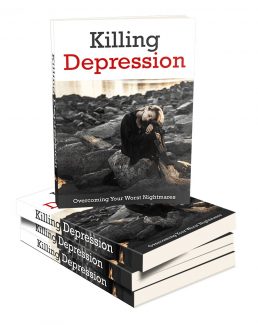 License Type: Master Resell Rights
License Type: Master Resell Rights  File Type: ZIP
File Type: ZIP
 SKU: 61637
SKU: 61637  Shipping: Online Download
Shipping: Online Download
Sample Content Preview
Introduction
I want to thank you for downloading this book “Killing Depression: Overcoming Your Worst Nightmares.” Congratulations, you have taken your first step toward understanding and battling one of the greatest sources of concern humanity has ever faced – depression. I hope, after reading this book, depression will be the least of your worries and you improve the control you have over your negative emotions.
“I am so depressed; you have no idea!” “I think I am going into depression,” “Why do you look so sad?” “Are you depressed?” are some of the questions and phrases that are scarily common. The word depression is used or thrown around so often to describe a mixture of almost any negative emotions. When your friend is sad or feeling low about something, how often do you hear or expect to hear one of the above phrases?
While it may be a common practice these days to refer to a negative feeling inside you as ‘being depressed,' the repercussions and the effects of a person who is suffering from depression are often ignored, sidelined or worse, they go unnoticed! It can affect the way you feel about yourself which, in turn, will make it very difficult and ‘depressing’ to get through your day-to-day chores. It is time to take a step towards a journey that will lead you to a depression free life.
On this journey, we will be taking the detailed route to understanding the concept of depression by diving deep into its roots and strategic methodologies you can use to overcome it. We will also be clarifying and clearing up the common misconceptions and myths that circle around depression.
Together, let’s kill one of the biggest sources of sorrow, woe, gloom, desolation and despair. Be prepared to overcome your worst nightmares, to enter a brighter and highly positive lifestyle and find out how you can gain mastery over your emotions instead of letting them run wild. Unravel the means to tap into the potential of your emotions in the search for the key to a successful and a happy life.
Chapter 1: Understanding Depression
The very first and most obvious step when it comes to overcoming depression is to understand it and accept the fact that depression is a real illness.
What is Depression?
Depression or Major Depressive Disorder or clinical depression is a serious but a prevalent medical illness that has adverse effects on the way you feel about yourself and others, the way you think and the manner in which you act. There may have been a time when going to a particular place would make you happy from the inside, irrespective of what your mood or emotional state was. The very same place might fail to cheer you up when you feel depressed.
Depression doesn’t only change the way you feel about a person or a place; it has the potential to affect you physically and drastically reduce your ability to carry out the most basic functions – be it at home, school or at work. Sleeping, eating and working can become tasks that you will not enjoy let alone get through in the usual manner.
Types of Depressions:
Like every other medical condition out there, depression too comes in various kinds that may develop under unique and varied circumstances. The most common ones are – Persistent Depressive Disorder (Dysthymia), Perinatal Depression, Psychotic Depression, Seasonal affective disorder and Bipolar Disorder. It is fundamental to remember that the types are purely subjective to the person and may vary from person to person.
1. Persistent Depressive Disorder:
Dysthymia, as it's commonly called in the medical profession, is usually diagnosed after the depressed mood has lasted for at least two years. A patient diagnosed with Persistent Depressive Disorder usually exhibits episodes of major depression, accompanied by periods of symptoms which are not as severe. However, symptoms normally last for a minimum of two years.
These symptoms may include apathy, anti-social behavior or even wanting to be alone. They may also include personal neglect.
Symptoms
Persistent depressive disorder (PDS) symptoms come and go over a period of years, and their intensity can vary with time. However, typical symptoms do not disappear for a little over two months at a time. In addition to the recurrent symptoms, there are chances of prominent depression incidences occurring during or before persistent depressive disorder. This illness is also called double depression.








